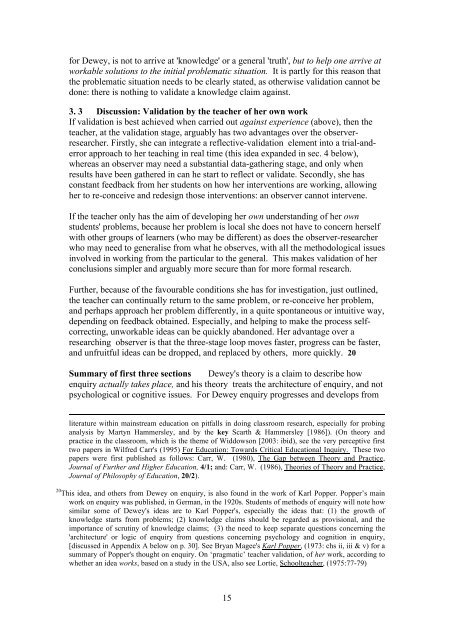RADICAL TEFL
2hqhXJd
2hqhXJd
Create successful ePaper yourself
Turn your PDF publications into a flip-book with our unique Google optimized e-Paper software.
for Dewey, is not to arrive at 'knowledge' or a general 'truth', but to help one arrive at<br />
workable solutions to the initial problematic situation. It is partly for this reason that<br />
the problematic situation needs to be clearly stated, as otherwise validation cannot be<br />
done: there is nothing to validate a knowledge claim against.<br />
3. 3 Discussion: Validation by the teacher of her own work<br />
If validation is best achieved when carried out against experience (above), then the<br />
teacher, at the validation stage, arguably has two advantages over the observerresearcher.<br />
Firstly, she can integrate a reflective-validation element into a trial-anderror<br />
approach to her teaching in real time (this idea expanded in sec. 4 below),<br />
whereas an observer may need a substantial data-gathering stage, and only when<br />
results have been gathered in can he start to reflect or validate. Secondly, she has<br />
constant feedback from her students on how her interventions are working, allowing<br />
her to re-conceive and redesign those interventions: an observer cannot intervene.<br />
If the teacher only has the aim of developing her own understanding of her own<br />
students' problems, because her problem is local she does not have to concern herself<br />
with other groups of learners (who may be different) as does the observer-researcher<br />
who may need to generalise from what he observes, with all the methodological issues<br />
involved in working from the particular to the general. This makes validation of her<br />
conclusions simpler and arguably more secure than for more formal research.<br />
Further, because of the favourable conditions she has for investigation, just outlined,<br />
the teacher can continually return to the same problem, or re-conceive her problem,<br />
and perhaps approach her problem differently, in a quite spontaneous or intuitive way,<br />
depending on feedback obtained. Especially, and helping to make the process selfcorrecting,<br />
unworkable ideas can be quickly abandoned. Her advantage over a<br />
researching observer is that the three-stage loop moves faster, progress can be faster,<br />
and unfruitful ideas can be dropped, and replaced by others, more quickly. 20<br />
Summary of first three sections Dewey's theory is a claim to describe how<br />
enquiry actually takes place, and his theory treats the architecture of enquiry, and not<br />
psychological or cognitive issues. For Dewey enquiry progresses and develops from<br />
literature within mainstream education on pitfalls in doing classroom research, especially for probing<br />
analysis by Martyn Hammersley, and by the key Scarth & Hammersley [1986]). (On theory and<br />
practice in the classroom, which is the theme of Widdowson [2003: ibid), see the very perceptive first<br />
two papers in Wilfred Carr's (1995) For Education: Towards Critical Educational Inquiry. These two<br />
papers were first published as follows: Carr, W. (1980), The Gap between Theory and Practice,<br />
Journal of Further and Higher Education, 4/1; and: Carr, W. (1986), Theories of Theory and Practice,<br />
Journal of Philosophy of Education, 20/2).<br />
20 This idea, and others from Dewey on enquiry, is also found in the work of Karl Popper. Popper’s main<br />
work on enquiry was published, in German, in the 1920s. Students of methods of enquiry will note how<br />
similar some of Dewey's ideas are to Karl Popper's, especially the ideas that: (1) the growth of<br />
knowledge starts from problems; (2) knowledge claims should be regarded as provisional, and the<br />
importance of scrutiny of knowledge claims; (3) the need to keep separate questions concerning the<br />
'architecture' or logic of enquiry from questions concerning psychology and cognition in enquiry,<br />
[discussed in Appendix A below on p. 30]. See Bryan Magee's Karl Popper, (1973: chs ii, iii & v) for a<br />
summary of Popper's thought on enquiry. On ‘pragmatic’ teacher validation, of her work, according to<br />
whether an idea works, based on a study in the USA, also see Lortie, Schoolteacher, (1975:77-79)<br />
15


